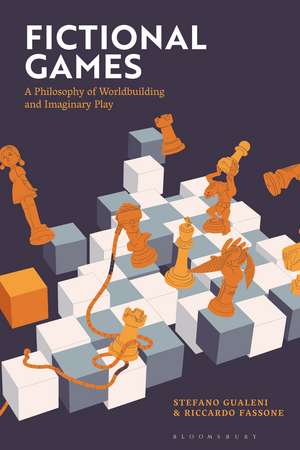Fictional Games: A Philosophy of Worldbuilding and Imaginary Play
Autor Stefano Gualeni, Dr. Riccardo Fassoneen Limba Engleză Paperback – 24 iul 2024
| Toate formatele și edițiile | Preț | Express |
|---|---|---|
| Paperback (1) | 190.75 lei 6-8 săpt. | |
| Bloomsbury Publishing – 24 iul 2024 | 190.75 lei 6-8 săpt. | |
| Hardback (1) | 510.03 lei 6-8 săpt. | |
| Bloomsbury Publishing – 11 ian 2023 | 510.03 lei 6-8 săpt. |
Preț: 190.75 lei
Preț vechi: 249.05 lei
-23% Nou
Puncte Express: 286
Preț estimativ în valută:
36.50€ • 37.71$ • 30.38£
36.50€ • 37.71$ • 30.38£
Carte tipărită la comandă
Livrare economică 25 martie-08 aprilie
Preluare comenzi: 021 569.72.76
Specificații
ISBN-13: 9781350277120
ISBN-10: 1350277126
Pagini: 216
Ilustrații: 20 bw illus
Dimensiuni: 156 x 234 x 25 mm
Greutate: 0.31 kg
Editura: Bloomsbury Publishing
Colecția Bloomsbury Academic
Locul publicării:London, United Kingdom
ISBN-10: 1350277126
Pagini: 216
Ilustrații: 20 bw illus
Dimensiuni: 156 x 234 x 25 mm
Greutate: 0.31 kg
Editura: Bloomsbury Publishing
Colecția Bloomsbury Academic
Locul publicării:London, United Kingdom
Caracteristici
Examines games in contemporary literature and film, with case studies from The Hunger Games and the science fiction of Iain M. Banks
Notă biografică
Stefano Gualeni is Associate Professor at the Institute of Digital Games, University of Malta, Malta. His recent publications include: Virtual Worlds as Philosophical Tools (2015) and Virtual Existentialism (2020). Riccardo Fassone is Associate Professor in the Department of Humanities at the University of Torino, Italy. His recent publications include: Every Game is an Island. Endings and Extremities in Video Games (Bloomsbury, 2017).
Cuprins
Foreword, Daniel Vella (University of Malta, Malta)1. Introduction2. On Fictional Games3. Fictional Games and Ideology4. Fictional Games as Utopian Devices5. Fictional Games as Deceptions and Hallucinations6. Fictional Games and Transcendence7. ConclusionBibliographyIndex
Recenzii
The first in depth examination of games within literature, this book takes us on a critical journey through several well known examples, examining the potential that games have to reflect philosophical and cultural values within fiction, as well as their place as essential moments of reflection, thought and ideologies within literary writing.
Gualeni and Fassone's brilliant volume provides a long-overdue analysis of the fascinating ways in which fictional games structure our understanding of fantastic storyworlds across different media. Their knowledgeable, affectionate, and compulsively readable study offers the reader tremendous insight into a compelling but largely overlooked topic.
Sitting at the intersection of cultural studies, philosophy, and games studies, Gualeni and Fassone provide an overview and preliminary taxonomy of how fictional games function across a range of media. Fictional Games thus opens important new directions in the study of such games, showing how they are more than mere narrative devices.
Gualeni and Fassone's brilliant volume provides a long-overdue analysis of the fascinating ways in which fictional games structure our understanding of fantastic storyworlds across different media. Their knowledgeable, affectionate, and compulsively readable study offers the reader tremendous insight into a compelling but largely overlooked topic.
Sitting at the intersection of cultural studies, philosophy, and games studies, Gualeni and Fassone provide an overview and preliminary taxonomy of how fictional games function across a range of media. Fictional Games thus opens important new directions in the study of such games, showing how they are more than mere narrative devices.
